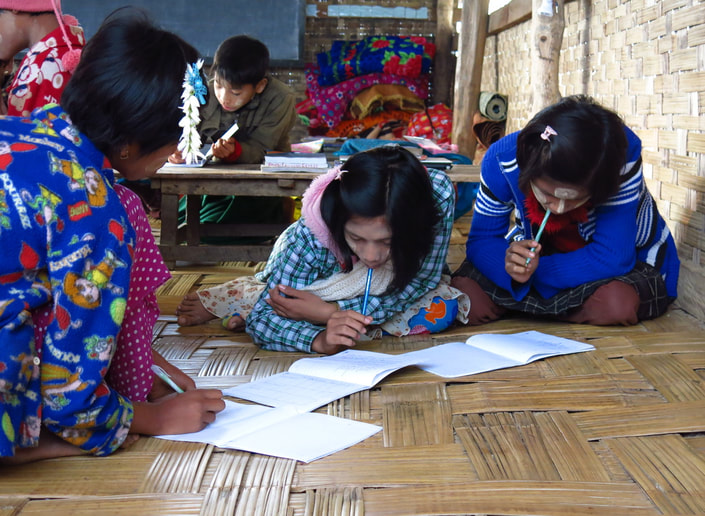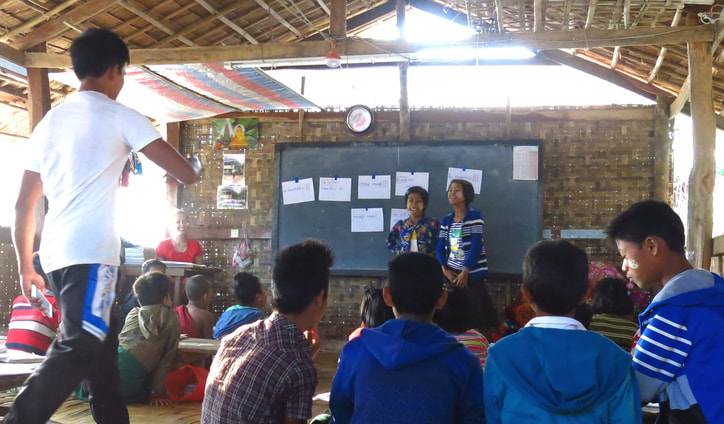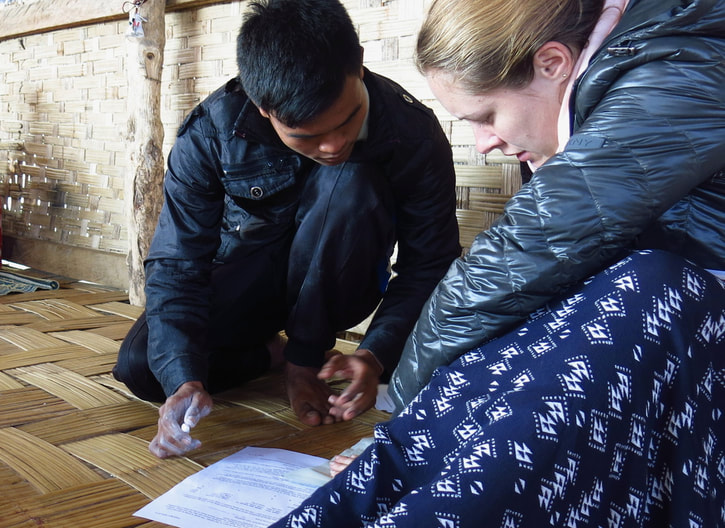|
After having taught for two weeks, our local teacher decided that we should test the students knowledge of the new material. He hoped that, if the students did well, as we suspected they would, he could show the data to the monk in favor of our new teaching method. I designed the test; not trusting my young trainee to dedicate the time needed to making it a decent, reliable and fair test. As I suspected, he had not planned anything on the morning of, and so I was able to save his bacon by revealing that I had in fact planned it. Of course, I do not like working this way; it is a problem for the local teacher trainee if he is not disciplined enough to follow through what he says he wants to do. However, the fact is that the children still need teaching and he is still learning. So, in this instance it was permissible. The test was composed of some fairly classic features; listening gap fill which I recorded but due to technological challenges ended up reading aloud in class three times. The native teacher also read the passage once to account for the difference in accents and miscomprehension. A writing section in which the students had to compose a typical conversation between buyer and seller in a marketplace. Plus a ‘find and correct the errors’ exercise and a chart of countable and uncountable noun conventions to fill in. These sections were duly translated by the local teacher who monitored and gave further translation of the instructions where necessary. After an hour and a half it was time for the children to hand over their tests. I was surprised that most had accepted their fate with very little in the way of moaning or complaining. The teacher had told them that they would watch a movie, so for them to instead have to sit a test seemed a little unfair. It would likely have produced mutiny in any UK classroom! Most of the children scored 9 or 10 out of 14 in the listening, which I regarded as a success. The local teacher actually advocated more aggressive grading than I would have used. He did not want to give any points for a word with the ’s’ missing from the plural form. I personally would have given a half point because they had at least heard the correct word. However, in a test concerned with plural and singular, the local teacher did have a good point that the students should have been paying enough attention to the overall meaning of the passage to realize where they needed the plural even if they had not heard the final sound on the word. One of the children scored an impressive 14 /14 and one left me wondering if dyslexia is a thing here. My trainee did say that he had once watched a movie about the concept, but didn’t seem to associate it with his country. The child had the ‘g’ in 'enough' the wrong way round physically, as well as switching every ‘a’ and ‘r’ in ‘are.’ At home this would be enough for me to send him for further testing, but here he is simply labeled as slow. In the writing section, there was an even spread of scores as I would suspect from any mixed ability class. The error correction section was the most well-completed. This slightly surprised me as many of my previous students have really struggled with this concept; often correcting the sentence to worse grammar than that with which we started. However, I think that error correction is an exercise that Myanmar students do in government schools, therefore they are familiar with the concept. Overall, the unannounced test showed that many of the students had taken the information and were able to apply it. I dislike the surprise element of the test if I’m honest; I don’t think it’s all that fair. However, I can see the benefit as we wanted to see what the children had taken in, not what they were able to cram in 2 days before the prescribed test. Next on my agenda is to change the way that grading is done for any writing that the students have. They wrote a short story which I asked my trainee to grade in his usual way. As I was expecting, he underlined and wrote the correction in red. I don’t think that this method of grading is really effective for the students. I have had to follow many grading stipulations at the various places I have worked. By far, the method I like most is providing a grading key for the students and writing a code alongside their error for them to find and correct. I know that this will work well for Myanmar students because they make the same errors again and again; most notably the forgetfulness of the subject verb agreement in the third person singular. As a compromise and to keep my students encouraged, I generally correct anything that they have not yet learnt in class in the traditional way, and I let certain mistakes slide if it is not what I want to focus on in that module. I will always correct in the least intrusive way if I am faced with an unclear sentence. I want the student’s writing to retain it’s character without the grammar.
Chloe Smith NEH Coordinator and Teacher Trainer Related Posts: Testing the Teachers Assessing Student Learning Am I Getting Through to These Students?
Comments
|
This section will not be visible in live published website. Below are your current settings: Current Number Of Columns are = 3 Expand Posts Area = 1 Gap/Space Between Posts = 20px Blog Post Style = card Use of custom card colors instead of default colors = Blog Post Card Background Color = current color Blog Post Card Shadow Color = current color Blog Post Card Border Color = current color Publish the website and visit your blog page to see the results |
|
© New Education Highway 2024
Except where otherwise noted, content on this site is licensed under a Creative Commons Attribution 4.0 International License. |




